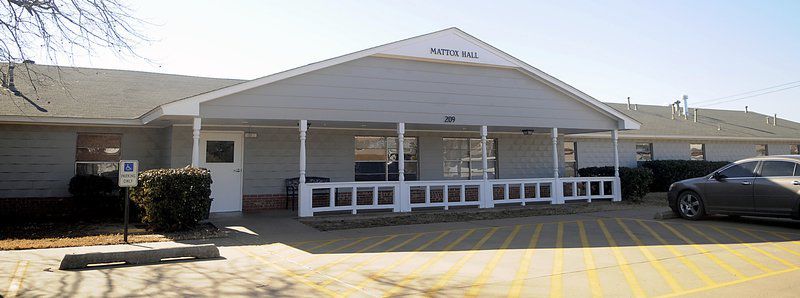A new care facility for people with intellectual disabilities opened last week in Garber.
Mattox Hall, which opened Jan. 15 at 209 E. Garber, is an intermediate care facility for individuals with intellectual disabilities. The facility is licensed through the Oklahoma State Department of Health for 16 people and is funded through Medicaid.
The facility was built by Hardin Properties and is operated by Oklahoma Homes for the Developmentally Disabled, owner Kelly Hardin said.
“I bought (Mattox Hall) out of a sheriff’s sale a couple of years ago with the idea of this, and it took a lot longer than we wanted, but we wanted to make sure it (was) done right,” Hardin said.
Mattox Hall is the third such facility of its kind owned by the company. The other two, Billings Fairchild Center and Albert Hall, both in Billings, have deep roots. Billings Fairchild Center opened in 1964, Hardin said.
In addition, Hardin said he’s purchased property in Enid and plans in the future to build at least two facilities similar to Mattox Hall. He estimates to break ground on the Enid project by fall this year.
Mattox Hall was formerly a nursing home, but closed for about 20 years before being purchased by a private individual who donated it to a local church. The property eventually ended up on a sheriff’s sale, where Hardin purchased it. After more than a year and a half of renovations, the facility was completed.
“If you’d seen it from the very beginning, you’d say, ‘No way.’ … Now it’s turned out to be just really nice,” Hardin said.
With the Garber facility opening Jan. 15, Hardin said a final inspection will be done in about 30 days, then they’ll get their final certifications. Current residents of the facility are attending workshops in Billings right now. There are now about eight residents, with the rest of the spots to be filled soon.
Consuela Logan, a qualified intellectual disabilities professional with the Billings and Garber facilities, said she’s excited for Mattox Hall opening.
“I’m just very excited, and a lot of our calls are for younger clientele. So it’s giving them a home in which they can grow and become more independent, and teaching all of those skills, giving everybody a sense of belonging, going into a new community that seems very receptive to the things that we’re trying to do. All of that is just very exciting to me is being able to provide more services for individuals with intellectual disabilities within the state,” Logan said.
The Garber facility, like the Billings ones, has residents from all over. In many cases, the residents are being moved closer to family.
“Our residents come from all over the state and from many different states as well,” Hardin said.
At Mattox Hall, residents wash their own clothes, cook their own food and for the most part take care of all of their own needs in a more independent, “patient-driven” setting, Hardin said.
Numerous residents have their own jobs or community involvements outside of the facility. Frequently, Hardin said staff and residents will take a passenger bus and go on outings in the community or nearby areas and attend sports games, go bowling or something else.
Each resident has their own private room, which comes with provided items such as a bed, television, chair and dresser. Residents have the option to bring their own beds and other furniture and items. There’s also numerous “common” areas, a dining section and kitchen, laundry rooms and a classroom and training area.
There are also plans to help residents with job placement by opening a car wash in the near future at the hall, Hardin said. A benefit to the Garber community is the facility bringing about 15-20 jobs, and residents becoming a big part of the community.
“Normally, the community is very involved because our residents are very happy, and they’ll see the residents at basketball games, or football games, things like that. They’re really tuned in. … They build a really close connection and are a great group of people,” Hardin said.
There’s an important need for intermediate care facilities such as these, Logan said. The wait list is long, and the state budget doesn’t provide much help. She said there’s especially a need for facilities such as these in western Oklahoma, where there are few such organizations.
With the facilities in Billings, Hardin said much of the community knows nearly every resident by name, and the residents are integrated into the community. He’s looking forward to Mattox Hall becoming a big part of Garber’s community much in the same way.
“The most important thing is that people with development disabilities, even though we’re in 2018, are still discriminated (against) by the general public … it’s kind of that idea of, ‘I don’t know how to deal with this.’ … the more you integrate people into the public, the more that they start to say, ‘Oh, this is not a bad thing, this is pretty good.’ So really getting people out, having jobs, getting them involved in the public, that really sets a tone where there’s a great rapport there,” Hardin said. “(We’ve) really integrated individuals who normally are looked at with questions, and (this) really helps them to show themselves and shine within the public and connect that back together in the way it should be.”
Story provided by: Enid News & Eagle
Written by: Jessica Miller


